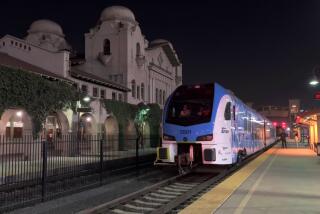Dubai Eyes Gold-Plated Transit System to Combat Gridlock
- Share via
DUBAI, United Arab Emirates — In this status-crazed city, where Porsches and Rolls-Royces compete for lanes with cement mixers and 4x4s, public transportation was never more than an afterthought for the underclass.
But booming construction and soaring population growth have left Dubai’s roads hopelessly clogged. Rulers have, perhaps reluctantly, embraced the fact that the oil-rich city will grind to a halt without a high-capacity rail network.
So planners have embarked on public transportation Dubai-style -- which means the project has to involve some sort of superlative.
At 42 miles, the driverless light-rail system will be the longest in the world when completed in late 2009. Workers broke ground in October, and construction of the $3.8-billion project also could set a record: just four years if things go according to schedule.
Perhaps most typically, Dubai’s metro will be the first with a VIP section.
“You’ve got so many people, so much development, you simply can’t build roads fast enough,” said Glenn Havinoviski, a consultant for Wilbur Smith Associates, a U.S. consulting firm working on technological solutions for Dubai’s traffic headaches. “It’s a lot more conducive to build some kind of public transport system as opposed to paving over the entire city.”
A consortium of four companies headed by Japan’s Mitsubishi Heavy Industries beat out Germany’s Siemens and Canada’s Bombardier to win the construction contract and a 15-year maintenance contract.
The first phase of the project, the red line, is to run from one end of the Persian Gulf city to the other, a full 32 miles, with 25 elevated stations and four underground ones.
Though fares have not yet been set, planners say one car will be reserved for women and children; the others will accommodate both sexes.
The automated trains, reaching a top speed of 62 miles per hour between sleek, air-conditioned stations, will offer panoramic views of one of the world’s fastest-growing cities.
By 2010, the 10-mile green line, the second phase, will connect major inland points with the largest of Dubai’s man-made, palm-shaped islands.
Many here grumble that the ruling family waited too long to build the rail system.
Fewer than 5% of the emirate’s 1.4 million residents use public buses and quaint wooden ferries known as abras. The rest drive cars or take taxis. For three hours every morning and evening, Dubai’s main highways are backed up for miles.
Currently, during rush hour, the 1.5-mile trip from Union Square downtown to the outlying World Trade Center can take an hour. The metro will handle the route in three minutes.
Dubai resident Abed Anabtawi said he wished the trains were running now. Anabtawi drives 12 miles along the red line route during rush hour, and it takes him about an hour and 15 minutes.
“There is no escape. Whichever road you take, there’s traffic,” he said. The rail system will slash his traveling time by more than half.
Experts say the congestion is stifling Dubai’s productivity.
“There are expectations in a business center like Dubai that things get done on time, that things can be accomplished,” said Havinoviski, the U.S. consultant. “There is no economic gain in wasting an hour and a half trying to go 3 kilometers and then spending an hour to park.”
Nasser Saeed, the metro’s assistant director, said the system was designed to carry 38,000 passengers an hour in each direction. Waits between trains will be far shorter because the system is driverless.
“It has become a necessity in Dubai,” Saeed said. “Every day, the capacity of the roads is decreasing. Travel time is increasing. Without it, the situation will become intolerable.”
Planners hope to bring in riders by catering to Dubai residents’ famous penchant for luxury: The VIP cars will offer bigger and plusher seats.
The goal, officials say, is to raise the number of commuters using public transportation to 35%.
But Dubai’s population is growing at 6% a year and car sales are rising almost 10% a year in the United Arab Emirates. Some experts wonder if the metro project may be too little too late.
More to Read
Sign up for Essential California
The most important California stories and recommendations in your inbox every morning.
You may occasionally receive promotional content from the Los Angeles Times.









